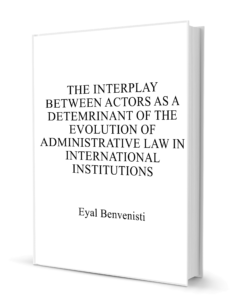
Eyal Benvenisti
Read PDFRead PDFThis article identifies and discusses the interaction between actors within international institutions as a determinant of the evolution of administrative law in those institutions. To that end, this article first outlines the different motivations for the development of domestic administrative law (Part II). This analysis provides the background for an attempt to identify the factors that shape the evolution of administrative law in international institutions (Part III). Part IV tests whether the evolution of international administrative law in the European Union (E.U.), the WTO, and the United Nations (U.N.) confirms theoretical expectations. Finally, Part V addresses the role of the ICJ in developing international administrative law in general. Part VI concludes by asserting that the comparative study of the evolution of administrative law in international institutions should not assume facile comparisons and generalities, but must be sensitive to the specific political constraints, to the factors influencing the balance of power within each institution, and to the balance of power amongst state parties to the institution. Any attempt to develop a unified administrative international law must remain acutely attuned to the specific constraints within each institution.


